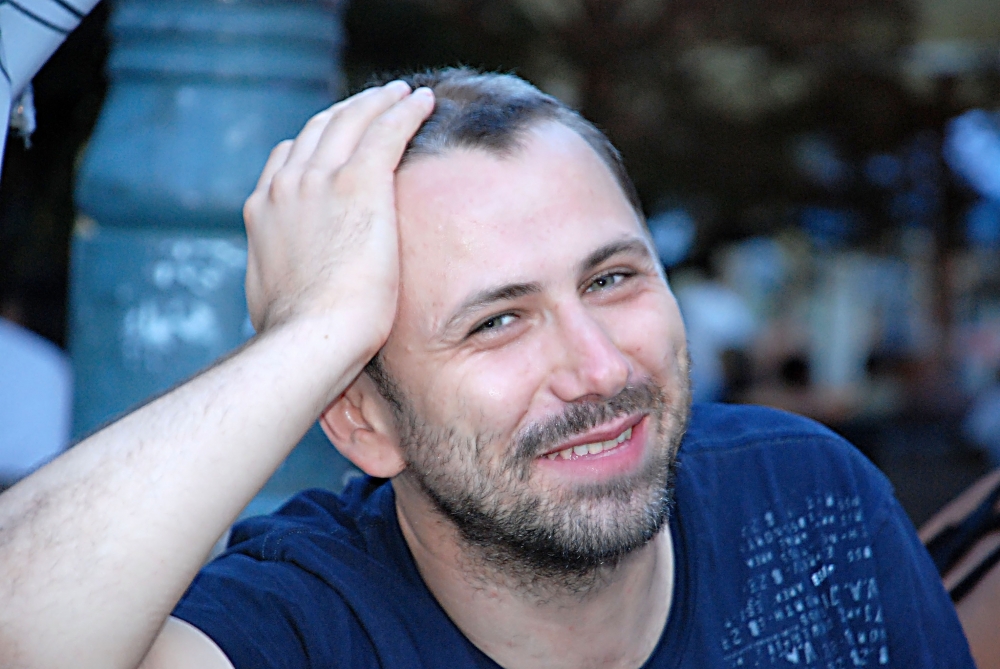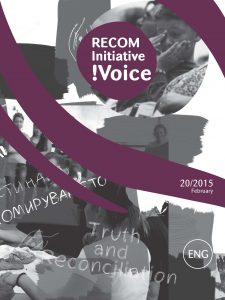
22.06.2015.
It is glorious to forget in the name of the motherland
Oliver FrljicNationalism, according to Ernest Gellner, is a political principle, which requires a coincidence of political and ethnic boundaries. The nationalist narrative constructs the public memory of those facts that can legitimize this principle. Anything that questions the aforementioned correspondence becomes officially forgotten, or has its meaning relativized.
In such a context, the place where counter-memory appears is of paramount importance – the memory that belongs to minority groups and that is “marginalized by the dominant culture.” When it serves as an instrument for various forms of social domination and resistance to it, memory becomes a political agent. As regards the politics of the post-Yugoslav theatre space, this space can be constituted precisely where official “memoricide,” is resisted, what official historiography has forgotten is commemorated, and radical reinterpretations of facts are offered that do not proceed from the premise of the nationalist congruency of the political and the national.
Sophocles’s Antigone showed this – a drama of imposed memories and imposed oblivion, followed by the assertion of a resulting oblivion and counter-memory. The story of a sister who decides to bury and mourn her brother who has been denied this right by decree of the highest center of political power, this play can function as an allegory of post-Yugoslav societies and their policies of remembering and forgetting. But more than that, the play is about the theatre as a place of liberating memory that has been prohibited.
The special status of memory, and specifically of counter-memory, has interested me in my own theatre work from the very beginning. This is precisely the point at which the wider public’s proverbial lack of interest in this medium is converted into distinct social antagonism. Instead of staging a conflict between fictional characters, theatre in this case generates a drama in the wider social field, in the space of normed forgetting and remembering in which theatrical space appears as transgression.
My own theatre worldview and language – a source of constant misunderstandings and challenge in most of the areas where I work – has been crafted precisely by my watching the Croatian theatre’s active or passive participation in officially prescribed oblivion. My misunderstandings with the Croatian theatre community culminated with the play Croatian Theatre, which was subjected to professional and media lynching because it asked some questions: “Can we still call theatre that which most of the Croatian theatre world has been producing since the war, if we agree that theatre should be a social, ethical and artistic act that has the courage to call acrime by its name, to deprive it of the right to rationalization, and to determine its guilt? What kind of theatre is it really, this majority Croatian theatre, that fails to recognize the tragedy of its fellow citizens? What kind of a theatre that which responds to fascism with fascism?”
The fascism of the Croatian theatre I dealt with in that play, about which the theatrical left and the theatrical right were both equally appalled, should be given a broader meaning – the way it was defined by Michel Foucault, for whom alongside “historical fascism, the fascism of Hitler and Mussolini,” there exists “the fascism in all of us, in our heads and in our everyday behaviour, the fascism of that makes us love power, that makes us want precisely that which dominates and exploits us.” The gradual “becoming-fascist” of Croatian society came about, among other things, through the uncritical attitude towards the authorities at the time when it sponsored the murder of Croatian citizens of the “wrong” nationality, as was the case with members of the Zec family, the murders in the Pakrac Valley, the naval port of Lora, the establishment of the concentration camps for Bosniaks in Western Herzegovina, the killing and expulsion of Serbs during Operation Storm. The Croatian theatre community has failed to give names to these crimes, much less deny them “the right to have a justification or to determine their guilt.”
On the contrary, in this period, the theatre community, through its work and public action, and sometimes literally by taking up arms, took part in the HDZ’s war-propaganda machinery. In 1991 Hrvoje Hitrec established The Croatian Artists’ Company, which included, among others, actress Jasna Bilusic and actor Perica Martinovic, as well as director Josko Juvancic and actor Ljubomir Kapor. Quite apart from from this Company, actor Sven Lasta, and directors Miro Medjimorec and Slobodan Praljak also joined the war. Kresimir Dolencic becomes a sort of court director in charge of directing various Tudjman ceremonies, the most famous of which was the Gojko Susak funeral and the military parade at Jarun. In 1997, Zlatko Vitez directed in the Croatian National Theatre in Zagreb a birthday event for Franjo Tudjman in which, among other participants, appeared Ena Begovic, Dragan Despot, Vanja Drach, Kruno Saric, Josko Sevo, Zlatko Crnkovic, Zarko Potocnjak, Franjo Kuhar, Mladen Vulic, Zvonimir Zoricic, Ivan Brkic, Ivanka Boljkovac, and Marko Torjana.
There are many more examples, and these are sufficient to show that the majority of theatre people in Croatia succumbed to the national hysteria, and that among them, unlike with some of their colleagues from Belgrade, no anti-war discourse was articulated, even when Croatia was deep into carving up Bosnia and Herzegovina, or when the information about the war crimes committed by the Croatian army became public. It is not surprising, then, that such a theatre community, which carried out its part in the officially prescribed forgetting and silence, now wants to forget its own self at that time.
That theatre folks are suitable material for oblivion and for convenient ideological moulding was shown with a post-war example, where once again we saw their high degree of mobilization in a war that continued by other means. I am referring to the “Request by 555 prominent Croatian public figures to the Government,” which required that the Croatian government refuse to extradite General Gotovina to the Hague Tribunal, and that it request from the Hague Prosecution the suspension of prosecution on the basis of the official indictment. The request was signed by the following theater artists: Nada Abrus, Jasna Ancic, Inge Appelt, Ivica Barisic, Slavko Brankov, Mirela Brekalo, Lukrecija Brešković, Ivan Brkic, Miljenko Brlecic, Senka Bulic, Helena Buljan, Boris Buzancic, Zlatko Crnkovic, Branka Cvitkovic, Velimir Cokljat, Dragan Despot, Boris Dvornik, Nina Erak, Mato Ergović, Lidija Florijan, Emil Glad, Ivo Gregurevic, Goran Grgic, Nives Ivankovic, Darko Janes, Vjekoslav Janković, Zdenko Jelcic, Ivan Joncic, Jasna Jukic, Trpimir Jurkic, Ljubo Kapor, Marija Kohn, Adam Koncic, Bozidar Koscak, Niko Kovac, Franjo Kuhar, Drazen Kuhn, Niksa Kuselj, Danko Ljustina, Mirjana Majurec, Slavica Maras-Mikulandra, Tomislav Martic, Ante-Cedo Martinic, Mise Martinovic, Maro Martinovic, Perica Marinovic, Damir Mejovsek, Igor Mesin, Boris Miholjevic, Darko Milas, Helena Minic, Vedran Mlikota, Suzana Nikolic, Mia Oremovic, Frane Persin, Sinisa Popovic, Zarko Potocnjak, Ksenija Prohaska, Ivica Pucar, Nada Rocco, Sinisa Ruzic, Davor Svedruzic, Boris Svrtan, Alen Salinovic, Krunoslav Saric, Josko Sevo, Glorija Soletic, Milan Strljic, Zvonko Torjanac, Romina Vitasovic, Zlatko Vitez, Edo Vujic, Mladen Vulic, Ivica Zadro, Mirta Zecevic, Zvonimir Zoricic, Jozo Zovko, Vladimir Geric, Branko Ivanda, Josko Juvancic, Lawrence Kiiru, Vlatko Perković and Zeljko Senecic.
Nomina sunt odiosa, but none of these names found their way onto any indictment that sought to prosecute those who had participated in “a joint criminal enterprise, the common purpose of which was the forcible and permanent removal of the Serbian population from the Krajina region, including by plunder, damaging or complete destruction of the property of the Serbian population, in order to discourage or prevent the return and re-settlement of members of that population in their homes.” For, whether it is about General Gotovina or anyone else, a crime remains a crime, and Croatian actors and theater professionals should finally realize that the ethnicity of the victim or the aggressor ought not to be a criterion of remembering or forgetting.
And until that happens, there is The Croatian Theatre, which is equally hated by actors and theatre professionals and defenders, and by the Catholic Church and most of the Croatian public. Such a broad coalition of haters already shows the power of theatre which, if only it wanted to retain a minimum of moral honesty for itself and the society it represents, would become a privileged place of the memories that all other institutions are in the business of erasing.
Oliver Frljic
The author is a theatre director from Croatia.















